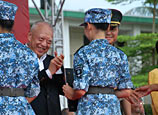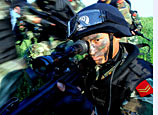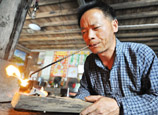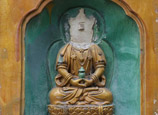
Related:
>> Western art classic finally translated
When my mother visited China at the age of 73, she said it was the first and would be the last time. Being an independent woman, she liked to go out by herself, without a guide or an interpreter. To her complaint, I replied: "But there is pinyin everywhere!" "Yes, but," she objected, "What is the use reading 'Youyi Binguan' if I don't know the meaning?" Good point.
Two years ago, in Hangzhou, Ningbo and Wuhan, I was asked my view on the recent standardization of topographic names. Should Minzhu Bei Lu be translated into Democracy North Rd. or North Democracy Rd.? The problem is not there, but what is the use for a foreign tourist to know that minzhu means democracy if he can't ask his way in English to a passer-by or a taxi driver? He could have more chance to get an answer if asking for Minzhu Bei Lu, whatever the tones are.
Another problem is the choice of road, avenue, boulevard, drive, street, lane, alley, for the Chinese "lu", "jie", "hutong", etc. Different names for the same Chinese word are used in translation in Shanghai, Chongqing or Beijing.
Imposing "Rd." to all the non-Chinese visitors creates another problem. Not all the visitors are English speakers, and "Rd." is unintelligible for most foreigners.
Regarding individual names as well as foreign companies, products and organizations names, I strongly recommend that the original name be kept, between parentheses, following its translation.
For the Chinese, the meaning of a character and its beauty prevail on its sound to the point that it’s often impossible to imagine, from its Chinese translation, what the original name was. For example, Yashi Landai is translated as 雅诗兰黛. I admit that these characters are appropriate for a person who is in the field of cosmetics and beauty. But phonetically, who could guess that Ya-Shi- Lan-Dai is the famous Estee Lauder? It could have been translated 爱丝缇老德儿, which is closer to the original pronunciation. But the Chinese translate for themselves, not for the non-Chinese, and they make a piece of art of each translation.
Names of foreign actors in film casts, or artists in museums, often become unrecognizable once translated.
When writing about the historical figure "Limadou", if the author had preserved the original name in Latin alphabet, a reader of any language could go online for deeper research about the famous Italian Matteo Ricci.
Another problem is the absence of uniformity. For instance, the "ka" syllable of Canada, Canon, and Carducci are translated into Chinese as 加, 佳, and 卡, respectively meaning "to add", "excellent", and "card". There are all positive meanings for the Chinese, but in fact, only the third one reproduces the sound "ka", others being pronounced "jia". If, as exists in Japanese, there were a series of characters reserved to the phonetic translation of foreign names, no matter the meaning of the characters, this could be very useful.
A large number of languages using romanization set one spelling for foreign words they use instead of translating these nouns. They choose the closest to the original pronunciation, and they all use the same word, such as "spaghetti" (Italian), "tennis" (English), "furher" (German), "corrida" (Spanish), "veranda" (Portuguese), "pacha" (Turkish), "Islam" (Arabic), "geyser" (Icelandic), "Inuit" (Eskimo), etc. That is a very pragmatic choice.
Chinese are obsessive sticklers for translation, saying "people will not understand. Some Chinese realities can't be translated. Jiaozi should remain jiaozi in other languages; they are not raviolis, or dumplings."
Sometimes translation borders on ridicule. "Hard Rock" became 硬石,literally "a hard stone". After Beijing subway line 4 opened, the well-known Hailong electronics market in Zhongguancun became Hilon market. Hailong means "Sea Dragon" in Chinese, a beautiful and powerful image. Even those who don't know Chinese can correctly pronounce Hailong. What was the reason to change it into Hilon, a word without meaning, more difficult to remember?
















 3 killed, 5 injured in S China knife attack
3 killed, 5 injured in S China knife attack


![]()
